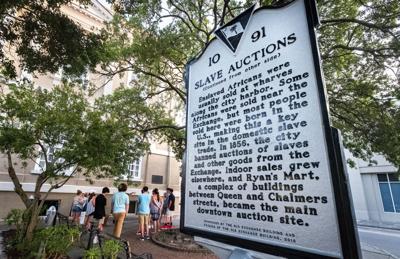Charleston made history last year when City Council formally apologized for the city's role in supporting the institution of slavery and the Jim Crow laws that followed abolition.
This June, exactly a year after adopting the resolution, the city will act on one of the resolution's recommended policy steps to begin addressing racial inequities that persist today.
The first-ever manager of Diversity, Racial Reconciliation and Tolerance will be hired in the legal department to identify those systemic problems and develop strategies to correct them.
City Attorney Susan Herdina said the position will operate much like the city's coordinator of the Americans with Disabilities Act, who evaluates building proposals for ADA compliance and responds to public complaints about accessibility in the city.
The new hire will run an office where people with marginalized identities and races can bring their complaints and experiences with hate crimes, as well as discriminatory practices in housing, lending or employment. The office will coordinate with the Charleston Police Department, and state and federal agencies, to help resolve cases.
But Herdina said it will also be an opportunity to track those instances, which the city hasn't done before.
"There’s not a lot of data on this issue," she said. "Having an office that is dedicated to diversity and tolerance and racial issues will be an opportunity for the city and the citizens to be more informed about these challenges and to help resolve them."
City Councilman William Dudley Gregorie, who was one of the architects of the apology resolution, said he's proud that the city is hiring someone to ensure its recommendations are carried out.
"We’re going to make the apology a real, living document and not just something that sits on the shelf," he said.
Other goals include providing better public education for African-American children and memorializing unmarked graves of African-Americans and enslaved Africans.
During the antebellum period, the city condoned slavery and even regulated it through “slave tags” — metal badges issued to slaves whose masters hired them out for work across the city. These tags denoted the slave’s working status.
During the Jim Crow era, the city also passed laws to suppress African-Americans by prohibiting certain gatherings, even those held at churches.
Gregorie said since the days of desegregation, racism has evolved to become less detectable, but more systemic.
"I think right now discrimination is so rampant, but it’s done with a smile. It’s disguised," he said. "You have to cut all the cancer out in order to get rid of it."
The manager of Diversity, Racial Reconciliation and Tolerance will also be tasked with evaluating city processes and regulations to identify any inequities at work.
The Sophia Institute's Social Justice Racial Equity Collaborative, which helped draft the apology language, applauded the city's progress.
"We welcome the collaborative efforts throughout the city and across city government," said Co-Chair Carolyn Rivers.







